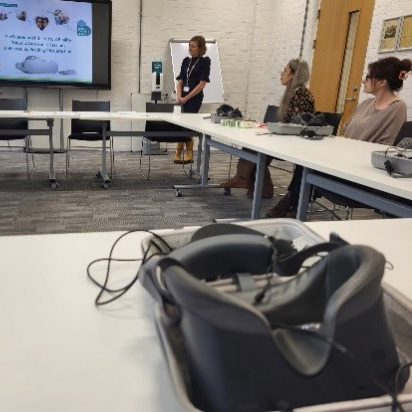Organised by Laura Purser (Academic Programme Director for the BA Primary Education (QTS)), the IoE welcomed the Brighter Futures, Reading Virtual School to our London Road Campus in spring 2024, giving a selection of our staff the unique opportunity to experience a VR trauma informed experience.
Going forward we are hoping to look at partnership and collaboration with the virtual school to explore potential applications for both IoE staff and ITE students to facilitate deeper understanding of the needs of children, with emphasis on mental health, trauma informed pedagogies and therapeutic approaches.
Read below for Laura Purser’s account of the session.
The IoE welcomed the Brighter Futures, Reading Virtual School to our London Road Campus on 29th February 2024, giving a selection of our staff the unique opportunity to experience a VR trauma informed experience.
Why Virtual Reality?
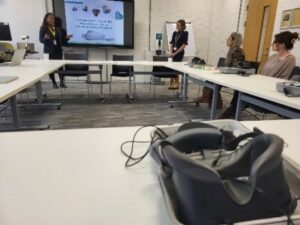
I was drawn to facilitating a VR experience partnership with Reading Virtual School, for some of our IoE team in the hope that a visceral and innovate experience would support deep learning in trauma informed practice and that we might envision a way of expanding the offer to other people, both staff or/and students, who may have interest in accessing this experience.
The endeavour to train educationalists in trauma informed practices, chimes very much with my personal research interests, exploring how we can best train our Initial Teacher Education (ITE) students to be trauma informed teaching practitioners to support child mental health. What Do We Need To Teach New Teachers About Child Mental Health? – Institute of Education (reading.ac.uk)
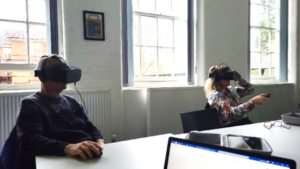
This is an area I am exploring by bringing in a new module ‘Mental and Physical Health: Psychology of Education’ to the BA Primary Education, QTS (BA Ed) programme for the year 3 cohort in 2024.25. This module intends to support the development of trauma informed pedagogies to inform primary teachers in their final year of training to apply into placement and beyond into their ECT years (Early Career Teacher). This is a goal that the Reading Virtual School shares, usually pitching their training at local schools, both primary, secondary and special, and supporting ECT in developing their trauma informed lens and bringing awareness to inclusive needs of all children and young people, with particular focus on those with a social worker and care.
Virtually Informed
The idea of VR to support the endeavour of understanding trauma in education was intriguing and creative in delivery to add a certain twist to the traditional psychoeducation known to proliferate trauma informed training. 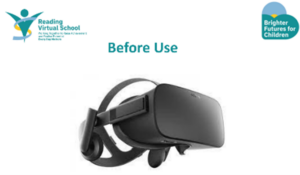 The use of VR as enhanced digital technological tools, have been backed up by evidence informed statistics. PwC (2021) found that putting learners in VR, allows for a greater depth learning experience compared to online, classroom, self-study or work packs. They found that VR learners are four times faster, more emotionally connected, more focused and 275% more confident.
The use of VR as enhanced digital technological tools, have been backed up by evidence informed statistics. PwC (2021) found that putting learners in VR, allows for a greater depth learning experience compared to online, classroom, self-study or work packs. They found that VR learners are four times faster, more emotionally connected, more focused and 275% more confident.
Activating the Embodied Brain
The intention, by putting learners in VR can increase their pace of learning and their application of the learning, equating to accelerated learning. This was extremely seductive as a medium of delivery which aids the ability of an individual to tap into compassion and their own interoception of both their cognitive mind and body, aligning to the concept of interpersonal, neurobiology (the relational, the brain and the nervous system integrated for the processing of trauma responses). The irony of the method aligning with this theoretical concept, is not lost on me and I jump at the chance to facilitate the session for our staff members.
Who took part?
A range of staff volunteered to participate in the session: Dr Sarah Marston (School Director of Teaching and Leaning); Professor Yota Dimitriadi (Course Leader for Secondary Computer Science, Chair of the Staff Disability Network); Shahneila Saeed (Director of the Digital Schoolhouse); Dr Alison Silby (Lecturer in Primary English, Specialism Lead); Simon Floodgate (Lecturer in Drama); Dr Suzy Tutchell (Associate Professor in Art Education, Co-School Director for Racial Equity and Justice)
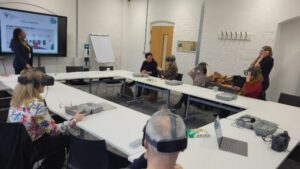
Some of the hopes to gain from the training was to consider how incorporating the use of technology and VR can develop trauma informed approaches, both in and outside the context of teacher training support. There was also interest in exploring the potential of trauma informed approaches towards art for healing and therapeutic art approaches across education.
What did we do?
It was an enlightening experience, not only using the innovative equipment but to educate us about the virtual school cohorts – looked after children, children with a social worker and EVER6 and children in kinship care. They shared the key activities for children with a social worker to enhance partnerships between education settlings and the local authority to be child centred in approach, identifying needs and addressing barrier to improve outcomes and progress by offering advice and support.
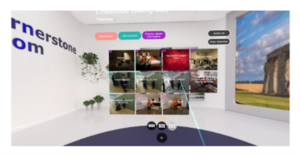
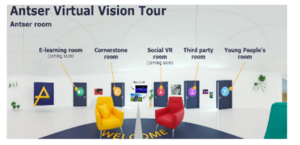
They shared a series of 3D VR short films to allow the participant to experience trauma from the point of view of a child. This tool is to complement training that is already available, rather than being used in isolation. The effectiveness comes from the reflective discussion around the VR tools. There was a particular focus on how the VR practice using technology could possibly enhance setting understanding of early trauma and impact on children and young people and explore how Early Career Teachers can effectively support traumatised children in schools.
To watch a preview of the films used click here: https://youtu.be/_efxELaCPf8
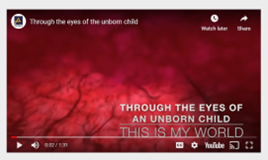
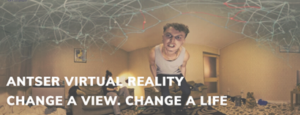
Staff Feedback:
Our staff felt that they had all gained something from the experience in different ways e.g. how the use of technology and these VR headsets can be in develop trauma informed understanding and gaining awareness of the existence and purpose of the Virtual School. There was also mention of the importance of collegiate and caring discussions around this sensitive topics, without making assumptions, understanding histories, care and consideration of our back stories to think forward.
There have been considerations for potential applications this experience could be used for to support our IOE staff and students. Our team have suggested it could be potentially used for safeguarding, behaviour management and SEND training. There was a suggestion of cross programme use in education e.g. academic tutors to support with care and sensitivity to approach to raising awareness of mental health and wellbeing of our students and all that we teach. It was raised that this VR experience can foster discussion regarding trauma informed practice with high relevance to ITE colleagues, but can be transferable for pastoral care for students. It would allow for analysis and discussion of teacher attitudes and practice.
Future Plans:
Going forward we are hoping to look at partnership and collaboration with the virtual school to explore potential applications for both IOE staff and ITE students to facilitate deeper understanding of the needs of children, with emphasis on mental health, trauma informed pedagogies and therapeutic approaches.
Laura Purser (Academic Programme Director BA Primary Education (QTS), Lecturer of Education/Professional Studies, Lecturer in SEND/Inclusion/Mental Health ITE, Chartered Psychologist)

